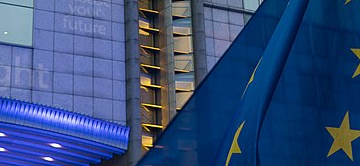The financial and economic sanctions so far imposed on Russia to force it to end its invasion of Ukraine have not yet had the desired impact. This column argues that cutting off the financing of the Russian aggression is essential and requires immediately banning imports of Russian oil and taxing imports of Russian gas, while cushioning the shock of these measures on households, especially those with low incomes.
Despite being subject to financial sanctions, the Russian government remains supplied with foreign currency by sales of fossil fuels. In particular, EU imports bring about €650 million every day to Russia. As French European Affairs Minister Clément Beaune has said, Europe is helping to fund the Russian war.
The disproportion of forces on the ground demands that further strong sanctions be reinforced immediately: implementing measures incrementally until 2023 may alleviate economic costs for Europe, but by then, Ukraine risks disappearing, despite her heroic resistance. This is why, in addition to the ten measures put forward by the International Energy Agency,1 we are proposing three measures to be enforced immediately by EU members, in order to cut off the financing of the war of terror waged by Russia.2
1. Complete ban on Russian oil imports
Europe imports about 4mb/d from Russia. It is possible to do without it because there are significant capacity margins outside Russia. Without a supply and demand response, a fall in global oil supply equivalent to EU imports could raise the price per barrel, currently around $100, to as much as $175, according to a study by Goldman Sachs (Deutsche Bank estimate $140, if no alternative crude oil supplies emerge). Taking into account the drop in demand and the increase in supply outside Russia, however, the increase would be much more moderate. In some European countries, the embargo could cause difficulties that will have to be managed by European solidarity.
2. A tax on Russian gas imports, proceeds allocated to Ukrainians
Unlike oil, whose market is global, the gas market is local and supply is hardly substitutable in the short term. A total embargo on Russian gas imports is unrealistic in the short term, given the level of dependence of some countries. A temporary tax on Russian gas imports would reduce demand and the rents paid to Russian suppliers. At the horizon of next winter, demand would be reduced and non-Russian supply increased. Thus, the price increase would not benefit Russian suppliers, whose income would be reduced.
The levy is amply justified by the massively negative financial externalities for Europe caused by the war, if only for the imperative welcoming of refugees. Its proceeds would be allocated exclusively to a solidarity fund with the Republic of Ukraine and Ukrainian refugees.
3. Cushion the shock on low incomes
The effects of the increase in oil, gas, and therefore electricity prices are proportionally greater for low-income households. Reducing fuel taxes would have the opposite effect to that intended, since it would not reduce demand and would keep Russian exporters' income intact. To maintain the price signal and the reduction in demand it entails without increasing social inequalities requires temporary fiscal transfers to low-income households.
Strongly reducing Russian fossil fuel imports is a political and moral necessity, but also an economic and ecological one. On the one hand, Russia has demonstrated that it is not a reliable supplier. On the other hand, the imperative of decarbonising European economies requires drastically reducing dependence on fossil fuels. Now is the time to complement long-term policies with immediate action.
Editors’ note: A French version of this column was published by Le Monde (15 March 2022), signed by:
Eric Chaney, Economic Advisor, Institut Montaigne
Christian Gollier, Managing Director, Toulouse School of Economics and CEPR
Thomas Philippon, Professor, New York University and CEPR
The full list of initial signatories (15 March 2022):
Stefan Ambec, Professor, INRAE, Toulouse School of Economics
Gilbert Cette, Professor, Neoma Business School
Eric Chaney, Economic Advisor, Institut Montaigne
Thomas Chaney, Professor, University of Southern California and CEPR
Elie Cohen, Research Director, CNRS
Jacques Delpla, Director, Asterion
Charles Dennery
Jean-Michel Glachant, Director, Florence School of Regulation, European University Institute
Christian Gollier, Managing Director, Toulouse School of Economics, and CEPR
Marc Ivaldi, Research Director, EHESS and TSE, and CEPR
Thomas Philippon, Professor, New York University and CEPR
Jean Pisani-Ferry, Professor, European University Institute and Sciences Po and CEPR
Richard Portes, Professor, London Business School and CEPR
Hélène Rey, Professor, London Business School and CEPR
Natacha Valla, Dean, Management and Innovation School, Sciences Po
Etienne Wasmer, Professor, New York University in Abu Dhabi and CEPR
Charles Wyplosz, Emeritus Professor, The Graduate Institute, Geneva, and CEPR
References
Bachmann, R, D Baqaee, C Bayer et al. (2022), “What if? The economic effects for Germany of a stop of energy imports from Russia”, ECONtribute Policy Brief No. 028, March.
McWilliams, B, G Sgaravatti, S Tagliapietra and G Zachmann (2022), “Can Europe manage if Russian oil and coal are cut off?”, Bruegel, 17 March.
Endnotes
2 McWilliams et al. (2022) give extensive data on EU imports of oil and gas from Russia and conclude that ‘A stop to Russian oil and coal supplies would push Europe into a short and painful adjustment period. But if managed well, disruptions would remain temporary.’ Bachmann et al. (2022) estimate the economic impact on Germany of an immediate and full block on imports of oil and gas from Russia. They conclude ‘…the effects are likely to be substantial but manageable. In the short run, a stop of Russian energy imports would lead to a GDP decline in range between 0.5% and 3% (cf. the GDP decline in 2020 during the pandemic was 4.5%).’
Article published in VoxEu, March 22, 2022
Illustration Photo by Ihor OINUA on Unsplash




